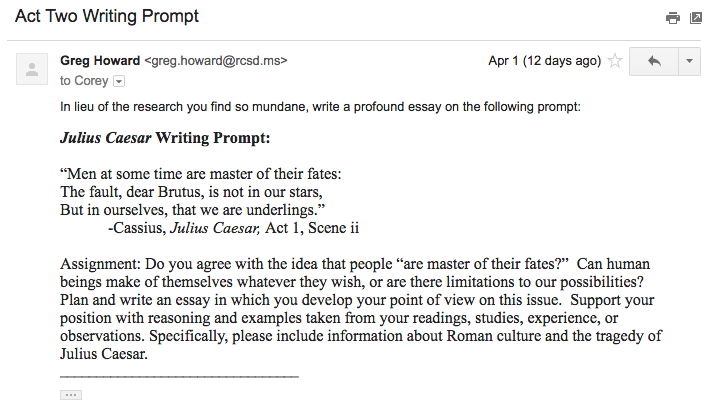
I have a lot of students who are capable of more than they realize. During our unit on Julius Caesar, I had students across the spectrum of understanding. Some shut down quickly due to the archaic and poetic language of Shakespeare, while I had some who soaked up the historical context and ignored the insults. A particular student, bored by a library research assignment intended to provide connections between Ancient Rome and Elizabethan England, complained to me about his assignment.
Initially, I was tempted to tell him to get over himself, but then I realized I could take this as an opportunity to extend the learning for him. He was already familiar with a lot of Roman military facts and philosophies due to some video games he played, so I thought I would provide him with some practice putting his own philosophy down on paper.
The above assignment was the alternative assignment I offered him and several other students I knew were a bit more advanced in their knowledge of history. This resulted in a variety of very interesting reads when I did the grading!
_________________________________________________________________
I have gone through a variety of methods as far as how I approach differentiation. Originally, I thought this had to take the form of tests with different questions–one version with DOK 1-2 questions only and one with higher order thinking involved for students at different ends of a spectrum.
However, the very way I tend to assess learning at the end of my second year has informed a more general way to differentiate. Almost all of my tests and assignments include basic multiple choice, matching, or true and false questions that cover base level comprehension of the text. For the next level, I require a written response with evidence-based argumentation at the core.
As I have discussed further in different sections of this portfolio, student writing is a major concern of mine. It is also where I am most realistic. By 10th and 11th grade, the polemic differences in ability between some of my students is drastic. That being said, ALL the students I teach can use evidence to support the reasoning behind their answers to an analysis question. I typically hand out the same assignment to all my kids, but I spend a lot of time moving around the room. I’m willing to explain questions more thoroughly to lower performing students, while I tell my AP kids to use their brains and figure it out.
This method keeps students from feeling separate from their peers while keeping the requirement of achievement realistic to their skill level.